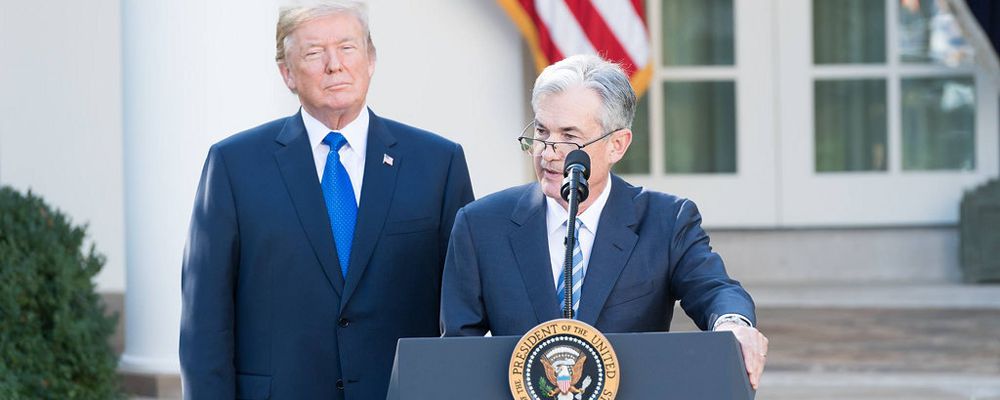Will the Fed reassess its strategies?
- Friday, October 12, 2018
 World markets took a heavy fall last week due to the concerns that US interest rates are likely to rise for further than previously expected. New York’s Dow Jones Index fell 5% over two days of trading while the FTSE 100 lost 1.9% to hit a six month low of 7007 points. Tokyo’s Nikkei Index was down 4% and Hong Kong’s Hang Seng down 3.8%. The Euro Stoxx 600 index of Europe’s leading companies fell to its lowest value in twenty months. Market value losses would be exaggerated due to the automated stock loss positions set up by institutional fund managers that would have been triggered by these falls.
World markets took a heavy fall last week due to the concerns that US interest rates are likely to rise for further than previously expected. New York’s Dow Jones Index fell 5% over two days of trading while the FTSE 100 lost 1.9% to hit a six month low of 7007 points. Tokyo’s Nikkei Index was down 4% and Hong Kong’s Hang Seng down 3.8%. The Euro Stoxx 600 index of Europe’s leading companies fell to its lowest value in twenty months. Market value losses would be exaggerated due to the automated stock loss positions set up by institutional fund managers that would have been triggered by these falls.
You may recall that we have been here before. Back in late February and early March markets fell off heavily on the concerns that US employment growth was fuelling wage inflation and consequently price inflation. Markets were spooked by the thought of higher interest rates. It then turned out that growth in wage inflation declined in the ensuing months and markets fully recovered the falls.
Strong economic growth is emanating from the USA in terms of GDP growth and the high levels of employment. The US is enjoying 4.2% GDP growth and its lowest level of unemployment at 3.7% in 48 years. These good news stories have had the impact of raising once again the expectations of inflation in wages and goods. This has prompted lenders to seek higher yields from US treasury bonds to cover the increased risk of rising interest rate and the potential of inflation.
US 10 year Treasury’s recently hit a seven year high of 3.23% meaning that world debt became more expensive as the US 10 year treasury bond is the price indicator of global borrowing. The Federal Reserve funds rate is 2.25% and is currently expected to rise again in December.
Up until now markets have taken the eight rate rises since 2015 in its stride as they have been relatively small and gradual. Market may have expected two more rises but the Fed has announced that it expects to maintain a constant pace of interest rate rises with four more rate hikes by the end of 2019. There has been a clear realisation that the Fed does mean to rein in on excess growth and inflationary pressures.
Even Septembers better than expected US inflation figures of 2.3% down from 2.7% in August and 2.9% in July failed to improve the sentiment on Wall St. This fall back in the cost of living eased the pressure on the Fed to raise the cost of borrowing and so bond yields fell back from the high of 3.23% to 3.14%.
This news that inflation had reduced on items such as food and energy provided President Trump with evidence that the Federal Reserve was tightening monetary policy faster and harder than it need to. Trump considers the US dollar to be overly strong. As markets fell last week President Trump said ‘it’s a correction that is caused by the Fed and interest rates. The dollar is very strong, very powerful and is causing difficulties doing business’ Trump thinks the Fed are making a mistake on monetary tightening.
With the President putting pressure on Jerome Powell, his own appointment as Federal Reserve Chairman, we may see Decembers proposed rate rise delayed and the increase in the reversal of quantitative easing from US$ 20bn per month to US$50bn per month put back just to ease market tension.
Interestingly, the source of the stimulus that has pushed on company profitability and stock growth was Donald Trump’s reforms. Capital sending in the US is strong, consumer confidence is near the peak last seen in 1968 and unemployment is the lowest since 1969. Trump has added tax reductions and infrastructure spending to further stimulate the economy. The Fed is seeking to limit the longer term downside of this stimulus. Trump is now realising that Jay Powell is not a ‘cheap money’ man.
Stocks started to rebound on Friday as investors saw the correction for what it was rather than a change in fundamentals. (Asian markets were up over 2% by the close of Fridays trading). World growth is slowing but the US economy remains robust. Many fund managers have taken the view that it is not surprising that there has been negativity in the markets with growth slowing, US interest rates rising, world debt levels growing and Trumps trade war rhetoric with China remaining aggressive ahead of the US mid-term elections on Tuesday 6th November. Commentators think that economic expansion will continue into 2019 as US tax cuts and spending increases are still feeding through.
This recent 5% equity slide and jump in credit costs may make the Fed reassess its strategies and slow the proposed tightening programme but not change it. Monetary tightening rates do point to an economic slowdown in 2019. With this in mind we will down risk all of our portfolios in January to reflect this.

Chris Davies
Chartered Financial AdviserChris is a Chartered Independent Financial Adviser and leads the investment team.
About Estate Capital
Financial Services
Our Contacts
7 Uplands Crescent,
Swansea, South Wales,
SA2 0PA.
Tel: 01792 477763
